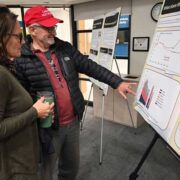- Solaria accuses Canadian Solar of using its patented design for a high-density solar module.
- Solaria says it shared the technology with Canadian Solar in 2014 under a non-disclosure agreement for a potential licensing deal.
- Solaria seeks damages and an injunction against Canadian Solar.
California — Solaria Corporation announced that it filed suit against Canadian Solar, in the Federal District Court for the Northern District of California.
The suit alleges that Canadian Solar, with operations primarily in China and elsewhere in Asia, infringes Solaria’s U.S. patent that covers a process for separating photovoltaic (PV) strips from solar cells for use in tiled or so-called “shingled” solar modules. Shingled modules have higher power and are more efficient than conventional solar modules.
Solaria asserts in the lawsuit that it first introduced Canadian Solar to its high-efficiency, high-density module (HDM) technology in 2014 when representatives of Canadian Solar evaluated Solaria’s next-generation shingling technology for a potential licensing deal.
After further collaborations between the companies over the ensuing year, in which Solaria disclosed its proprietary technology and business strategies to Canadian Solar under an NDA, no deal was reached.
In an apparent reference to Solaria’s proprietary HDM technology, Canadian Solar launched its “HiDM” shingled modules last year and began advertising and selling them in the United States. Solaria maintains that Canadian Solar’s HiDM shingled modules infringe Solaria’s patent, for which it seeks damages and injunctive relief.
“Solaria has invested over $200 million in developing its technology over the last decade to create the most advanced solar panels in the world,” said Solaria CEO Suvi Sharma. “When foreign companies such as Canadian Solar ignore American patents and violate our core IP, we will take action to enforce and protect the technology that took so much effort and investment to develop.”
Solaria indicated that it may bring additional claims, including additional patent infringement claims and a claim for misappropriation of trade secrets if warranted.













Comments